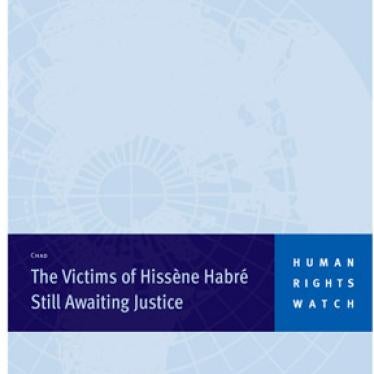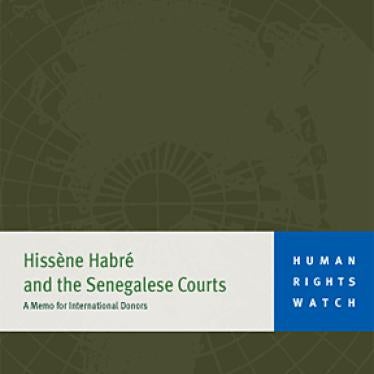(New York)- Nearly fifteen years after the fall of Chad’s brutal Cold War dictator, Hissène Habré, dozens of his henchmen still hold positions of power in the West African country, Human Rights Watch said in a report released today.
During all these years, however, the thousands of victims of torture and killings under Habré’s U.S.-sponsored rule have never received compensation or recognition from Chad’s current government.
Habré, who fled Chad on December 1, 1990, was indicted in Senegal in 2000 on charges of torture and crimes against humanity. However, Senegalese courts ruled that he could not be tried in the country, where he remains in exile. Habré now faces similar charges in Belgium, where a judge is pursuing an investigation that may lead to an extradition request.
In a 42-page report, “Chad: The Victims of Hissène Habré Still Awaiting Justice,” Human Rights Watch documented how 41 leading Habré-era figures, many accused of torture and killings, still hold key posts in Chad, including top state security jobs.
“Hissène Habré may face prosecution abroad, but his henchmen still enjoy complete impunity back home,” said Reed Brody of Human Rights Watch, who leads the international effort to prosecute Habré. “Former torturers hold top government jobs while victims and their families have never received any compensation.”
Human Rights Watch said that many leaders of Habré’s dreaded political police, the Documentation and Security Directorate (DDS), are still active. Cases filed against them by victims in Chadian courts are at a standstill because the responsible judge has not been given the means or the security to allow him to investigate.
Among the three directors of Habré’s DDS still living in Chad, one is the regional delegate of the national police, a second is a regional governor, and a third works for the ministry of communications. One ex-DDS branch chief accused in court of torture is currently the cabinet secretary of the national police chief.
Moreover, a man that Chad’s truth commission in 1992 identified as one of the country’s “most brutal torturers” under Habré is now a district police commander. An ex-deputy director of national security currently serves as the powerful director of the Judicial Police. An ex-DDS branch chief, against whom many cases of torture have been filed, is now chief of security at N’Djaména’s international airport. And former director of national security under Habré now occupies the post of national co-coordinator of the country’s petroleum zone, while the former warden of the “Locaux,” one of the DDS’s detention centers, is now warden of the main jail in the capital, N’Djaména.
The report also shows how Habré’s victims and their families have never received any reparations from the government. In March 2005, the Chadian Association of Victims of Political Repression and Crimes (AVCRP), which represents more than 1,000 of Habré’s victims, formally presented a draft law to the National Assembly seeking compensation for Habré’s victims.
The Chadian government has still failed to implement recommendations made by the truth commission in 1992 to construct a monument to honor the memory of the victims or to transform the former DDS headquarters and underground prison into a museum.
“Hissène Habré is being investigated abroad, but we, his victims, are being forgotten,” said Ismaël Hachim Abdallah, president of the AVCRP. “We are still waiting for the Chadian government and society to recognize the suffering that we and our families endured.”
Human Rights Watch cited the aggression against Jacqueline Moudeïna, the lawyer for Habré’s victims in the Chadian cases against the ex-DDS agents, as evidence of the continuing power of these agents. Moudeïna was severely injured in 2001 in a grenade attack by a police squad commanded by Mahamat Wakaye, the deputy director of National Security under Habré. Wakaye, who is currently director of the Judicial Police, is one of those accused of torture in criminal complaints filed by Moudeïna on behalf of Habré’s victims. Although pressure from Chadian and international rights groups forced Wakaye to stand trial for the attack, he was acquitted in November 2003.
In November 2004, Human Rights Watch learned that another one of Chad’s “most feared torturers,” Mahamat Djibrine, was serving in the civilian police with the United Nations Operation in Côte d’Ivoire (ONUCI). In fact, in the U.N. peacekeeping mission, Djibrine was given the responsibility to investigate human rights complaints. Before being sent to Côte d’Ivoire, he was chief of staff for the director-general of the Chadian National Police. In January, after a complaint to the United Nations by Human Rights Watch, the Chadian government recalled Djibrine.
The Human Rights Watch report includes a compilation of allegations against the former DDS agents based on abandoned DDS files discovered by Human Rights Watch, as well as dossiers prepared by the AVCRP and 150 interviews with victims conducted by Human Rights Watch and the International Federation of Human Rights Leagues.
Background on the Hissène Habré Case
Hissène Habré ruled the former French colony of Chad from 1982 until he was deposed in 1990 by current President Idriss Déby and fled to Senegal. His one-party regime, marked by widespread atrocities, was backed by the United States and France, which saw him as a bulwark against Libya’s Muammar el-Qaddafi. Under President Ronald Reagan, the U.S. gave covert CIA paramilitary support to help Habré take power and remained Habré’s strongest ally throughout his rule, providing his government with massive amounts of military aid. A 1992 truth commission report accused Habré’s regime of some 40,000 political murders and systematic torture.
Habré was indicted in Senegal in February 2000 on charges of torture and crimes against humanity before the Senegalese courts ruled that he could not be tried there. Habré’s victims then filed complaints in Belgium under that country’s now-repealed, long-arm “universal jurisdiction” law, and Senegal acceded to a U.N. request to hold Habré, pending an extradition demand. A Belgian judge and police team visited Chad in 2002, where they questioned victims and Habré-era officials, visited former prisons and took the files of Habré’s dreaded political police, unearthed by Human Rights Watch.
The case was not affected by the repeal of Belgium’s “universal jurisdiction” law because an investigation had already begun and several plaintiffs are Belgian citizens. The Belgian judge is continuing his investigation and it is hoped that he will indict Hissène Habré and seek his extradition.







